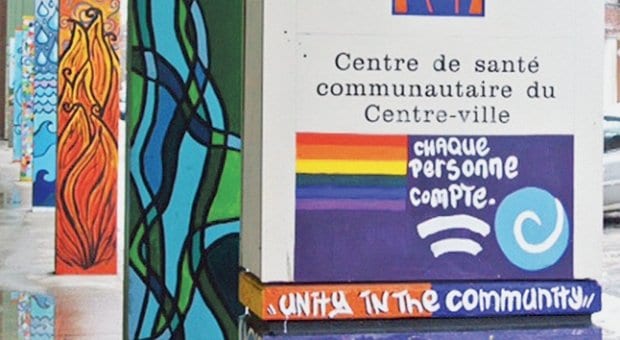When most of us think about healthcare, it tends to go something like this: you go to the doctor when you’re sick, and when you leave you’re on your way to being healthy again; end of story. But when we think about health, we don’t always consider the psychological and social factors that contribute to our well-being as individuals and as a society. Whether a community has access to healthful, affordable food, public transportation, affordable child and medical care, and whether it has support systems in place for its most vulnerable populations all affect its overall well-being. These factors are called the social determinants of health, and they include where people work, play, eat and live. When a community has access to these things, its overall health is improved. At the Centretown Community Health Centre, this principle is first and foremost.
Active in Ottawa since 1969, the Centretown CHC is a non-profit community health centre offering a full range of health and social services to more than 13,000 residents each year from within a catchment area of Centretown, the Glebe and Old Ottawa South. Their team includes doctors, nurses and nurse practitioners, social workers and counsellors, dieticians, community developers, health promoters and outreach workers. The centre also has a wide range of award-winning queer services — everything from anonymous HIV testing to counselling and medical care for members of the trans community. “Our mission is to provide good healthcare that meets the broad range of people’s needs,” says Ernie Gibbs, mental health counsellor for lesbian, gay, bisexual and trans youth. “People benefit from that when it’s all under one roof.”
In addition to providing on-site primary healthcare and counselling, the Centretown CHC also partners with a number of organizations to reach out to specific populations within the queer community. The GLBTTQ Youth Program, for instance, has a long history of working with the Ottawa-Carleton District School Board and provides workshops and training for people working with queer youth. Gibbs works specifically with people aged 12 to 25 who are having significant difficulties around their mental health and sexual identities, and counsels youth who are looking to transition. “I do an in-depth social assessment around their history and gender identity,” he explains. The centre is currently working toward its goal to increase capacity for trans healthcare, in addition to providing access to counsellors trained in hormone-replacement-therapy assessments and connecting trans patients to local doctors offering hormone starts.
In addition to programs for queer youth and the trans community, the Centretown CHC also provides services and outreach for seniors. The Ottawa Senior Pride Network, for instance, works with the Good Companions Centre to help bring queer seniors together, decreasing isolation and providing opportunities for social interaction. “I think part of it is demystifying what it means to be an older adult and GLBTTQ,” Gibbs says.
With its numerous outreach groups and activities, the Centretown CHC acts as a hub for queer people who need access to services beyond just primary healthcare.
“That’s a uniqueness to us as a CHC,” Gibbs says. “It’s a hub where things can happen more organically.” The centre also runs Gay Zone, a wellness group for men who have sex with men that offers clinical services, such as free, confidential HIV testing on Thursday evenings, hepatitis A and B vaccines, and more diverse activities, such as yoga, film screenings and a book club. The group provides an area of common ground for gay men who are out and sexually active. “We don’t want to stigmatize that,” Gibbs says. “We want to celebrate it.”
In addition to its numerous outreach programs, the Centretown CHC also has a community-elected board governing its high-level programming decisions, which includes members of the queer community. “Having LGBT people on the board has historically served us well in being able to do LGBT work,” Gibbs explains.
“We act as ambassadors to and from the community and communicate those ideas and concerns back to the community,” says board president Jeff Morrison. “There’s no such thing as a cookie-cutter approach.” This allows the centre to be responsive to the needs of the community it serves and to plan and change its programming accordingly. “The service mix is sort of always in flux depending on the changing demographics.” Morrison also uses the centre for his own primary medical needs. “The quality of the care is excellent,” he says, noting the convenient downtown location and the broad range of services offered.
One of the centre’s core values is that of mutual respect. Services are always offered in a climate of equality, free from judgment or discrimination. “Those are values and that’s a culture that people who are coming and using the CHC really appreciate,” Morrison says, adding that this is especially beneficial for queer communities, who are able to access counselling and support services as well as their medical needs under one roof. “It’s all sort of a one-stop shop, if you will.”
As for what’s next in terms of queer programming, exciting things are afoot. “One of the next things we’re looking at in 2013 is how the CHC can use its resources to support the Village project on Bank,” Morrison says. “I think 2013 will be a very interesting year.”


 Why you can trust Xtra
Why you can trust Xtra


